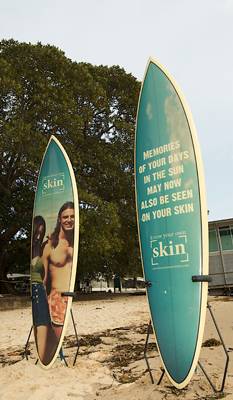The Know Your Own Skin Campaign

The Know Your Own Skin Campaign
With summer fast approaching, former IronMan champion Guy Leech is leading a new health education campaign to raise awareness of sun damage amongst the generation of Australians who spent their youth baking in the sun.
The Know Your Own Skin campaign is supported by new research which shows that whilst 93 per cent of Australians over the age of 40 have suffered from sunburn, over one third doesn't think they are at risk of sun damage because they currently avoid the sun and use sun protection. However, for the vast majority of 'baby boomers", the damage has already been done. In fact, two in three Australians will be diagnosed with skin cancer before the age of 70.
It is this low awareness that has prompted the development of the Know Your Own Skin campaign, visit: www.knowyourownskin.com
Guy Leech said he could relate to his own experience.
'I started training for the IronMan series when I was 17 and have spent the last 30 years training and competing out in the harsh Australian climate," he said.
'Like me, many people over the age of 40 lived in the pre-Slip Slop Slap era, enjoying time in the full sun with minimal protection. Back then, we were not as aware of the dangers of spending too much time in the sun.
'The first signs of real damage showed a few years ago when I discovered a sun spot on my forehead. I went to the doctor and had it treated before it had a chance to progress to something more dangerous."
On average, there are 2,633 hours of sunshine every year in Australia and approximately 7.2 sunlight hours for each day. As we age, the evidence of previous sun damage becomes more obvious on our skin. Sun spots (also known as solar keratoses) develop from repeated sun exposure.
 n some cases, sun spots can progress to skin cancer. Up to one in two Australians over the age of 40 will develop a sun spot, which may lead to skin cancer if left untreated.
n some cases, sun spots can progress to skin cancer. Up to one in two Australians over the age of 40 will develop a sun spot, which may lead to skin cancer if left untreated.
In addition to Guy Leech, a number of leading experts have been involved in the development of the campaign, including Dr Stephen Shumack, a Consultant Dermatologist from Sydney's Royal North Shore Hospital.
'Know Your Own Skin is a health education campaign designed to help raise awareness of the long-term consequences of repeated sun exposure and the need to identify skin lesions early," Dr Shumack said.
'The skin is the body's largest organ and the only one that is regularly exposed to the sunshine – particularly during the Australian summer. Early detection and treatment of sun damage can reduce your risk of potential skin cancer development and keep your biggest organ healthy and functioning as it should."
There is an obvious need for the Know Your Own Skin campaign with recent research highlighting that the vast majority of Australians (almost 9 in 10) would like to receive more information on skin conditions.
A great deal of useful information can now be found at the Know Your Own Skin website www.knowyourownskin.com including details on the many roles of the skin, advice on what sun damage signs to look out for and personal stories from Guy Leech and other Australians with experience of sun damage.
According to Guy Leech, now is the time for Australians to start thinking about past sun damage and the impact it may have on their skin now or in the future.
'The potential consequences of previous sun damage can be serious," he said. 'Whilst you're stripping off on the beach this summer and applying sunscreen, think about the years you've already spent in the sun and what damage could be lurking beneath the surface.
'It's only now that the baby boomers' carefree years of sun-baking are catching up with us. Make sure you speak to your doctor if you notice anything unusual, to ensure you stay as healthy as possible for many more summers to come."
Sun Damage
Sun spots (also known as solar keratoses) develop with too much sun exposure. In some cases, sun spots can lead to non-melanoma skin cancer. It is not known which areas of sun damage will turn into skin cancer so it is important to check all sun spots regularly for signs of change.
Sun spots should be treated as in many cases they may develop into skin cancer. If left untreated, non-melanoma skin cancer can have serious consequences.
There are approximately 430,000 new cases of non-melanoma skin cancers each year and over 400 people do not survive.
Ask your doctor to include a skin check as part of your routine medical check-ups. Your doctor is the best person to tell you if you have sun damage. If you do, there are effective treatments that can be used.
The Know Your Own Skin campaign is supported by new research which shows that whilst 93 per cent of Australians over the age of 40 have suffered from sunburn, over one third doesn't think they are at risk of sun damage because they currently avoid the sun and use sun protection. However, for the vast majority of 'baby boomers", the damage has already been done. In fact, two in three Australians will be diagnosed with skin cancer before the age of 70.
It is this low awareness that has prompted the development of the Know Your Own Skin campaign, visit: www.knowyourownskin.com
Guy Leech said he could relate to his own experience.
'I started training for the IronMan series when I was 17 and have spent the last 30 years training and competing out in the harsh Australian climate," he said.
'Like me, many people over the age of 40 lived in the pre-Slip Slop Slap era, enjoying time in the full sun with minimal protection. Back then, we were not as aware of the dangers of spending too much time in the sun.
'The first signs of real damage showed a few years ago when I discovered a sun spot on my forehead. I went to the doctor and had it treated before it had a chance to progress to something more dangerous."
On average, there are 2,633 hours of sunshine every year in Australia and approximately 7.2 sunlight hours for each day. As we age, the evidence of previous sun damage becomes more obvious on our skin. Sun spots (also known as solar keratoses) develop from repeated sun exposure.
 n some cases, sun spots can progress to skin cancer. Up to one in two Australians over the age of 40 will develop a sun spot, which may lead to skin cancer if left untreated.
n some cases, sun spots can progress to skin cancer. Up to one in two Australians over the age of 40 will develop a sun spot, which may lead to skin cancer if left untreated.In addition to Guy Leech, a number of leading experts have been involved in the development of the campaign, including Dr Stephen Shumack, a Consultant Dermatologist from Sydney's Royal North Shore Hospital.
'Know Your Own Skin is a health education campaign designed to help raise awareness of the long-term consequences of repeated sun exposure and the need to identify skin lesions early," Dr Shumack said.
'The skin is the body's largest organ and the only one that is regularly exposed to the sunshine – particularly during the Australian summer. Early detection and treatment of sun damage can reduce your risk of potential skin cancer development and keep your biggest organ healthy and functioning as it should."
There is an obvious need for the Know Your Own Skin campaign with recent research highlighting that the vast majority of Australians (almost 9 in 10) would like to receive more information on skin conditions.
A great deal of useful information can now be found at the Know Your Own Skin website www.knowyourownskin.com including details on the many roles of the skin, advice on what sun damage signs to look out for and personal stories from Guy Leech and other Australians with experience of sun damage.
According to Guy Leech, now is the time for Australians to start thinking about past sun damage and the impact it may have on their skin now or in the future.
'The potential consequences of previous sun damage can be serious," he said. 'Whilst you're stripping off on the beach this summer and applying sunscreen, think about the years you've already spent in the sun and what damage could be lurking beneath the surface.
'It's only now that the baby boomers' carefree years of sun-baking are catching up with us. Make sure you speak to your doctor if you notice anything unusual, to ensure you stay as healthy as possible for many more summers to come."
Sun Damage
Sun spots (also known as solar keratoses) develop with too much sun exposure. In some cases, sun spots can lead to non-melanoma skin cancer. It is not known which areas of sun damage will turn into skin cancer so it is important to check all sun spots regularly for signs of change.
Sun spots should be treated as in many cases they may develop into skin cancer. If left untreated, non-melanoma skin cancer can have serious consequences.
There are approximately 430,000 new cases of non-melanoma skin cancers each year and over 400 people do not survive.
Ask your doctor to include a skin check as part of your routine medical check-ups. Your doctor is the best person to tell you if you have sun damage. If you do, there are effective treatments that can be used.
MORE






